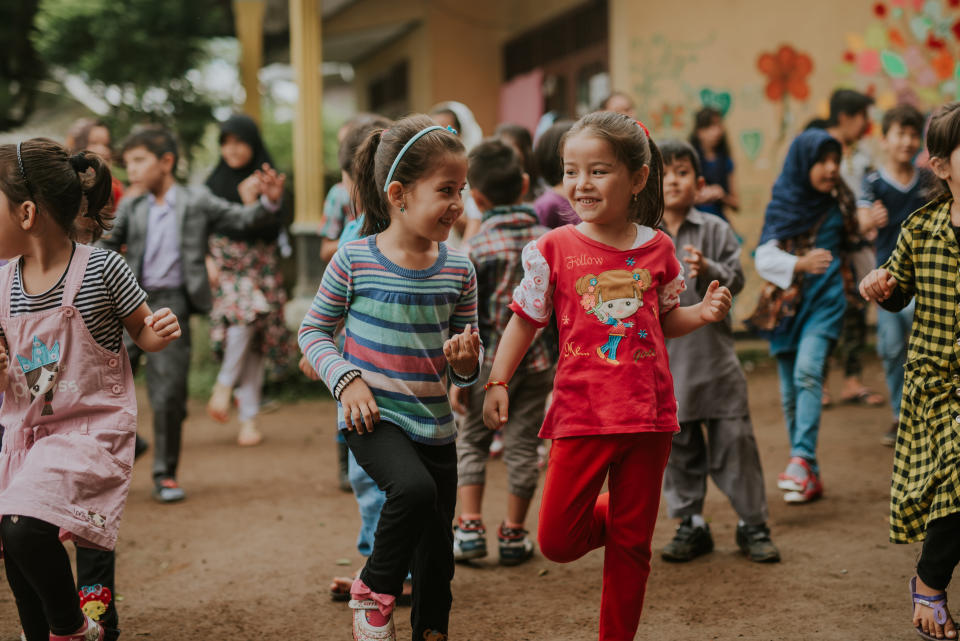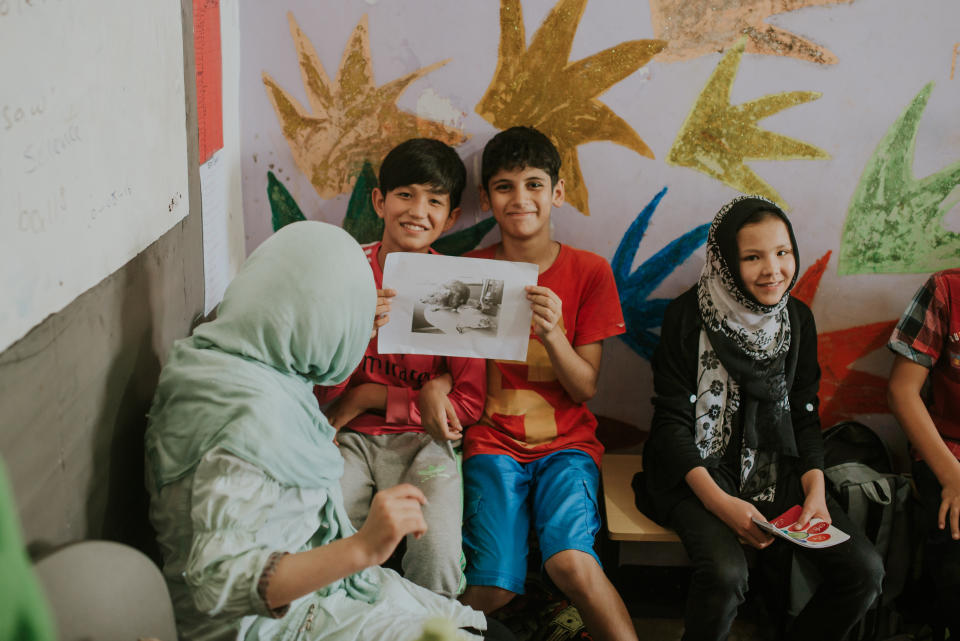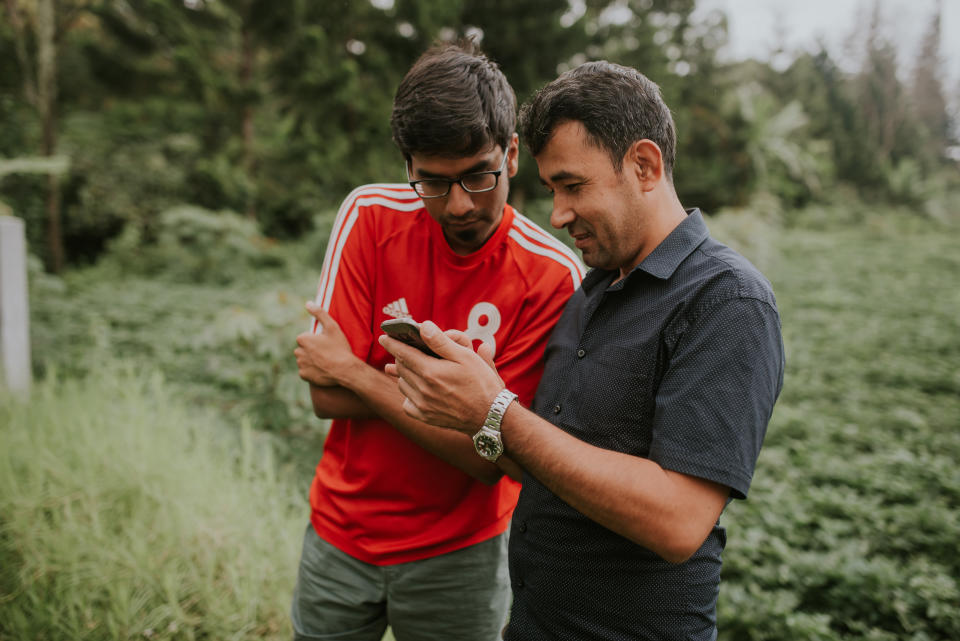2 Singaporeans tell stories of Afghan child refugees in Indonesia

SINGAPORE — In hearing the accounts of children at a refugee community in Cisarua, Indonesia, Singaporean journalist Prabhu Silvam sometimes found himself at a loss for words.
Together with his university mate and compatriot Kenneth Lee, 31, the duo had set out to record the stories of young refugees at the Cisarua Refugee Learning Centre (CRLC) in 2016. Many of the students are Hazaras, an ethnic minority from Afghanistan, while others come from countries like Iran, Pakistan and Iraq.
Seven-year-old Maryam, a Hazara, would ask Silvam repeatedly if he knew where her mother and sister were. “Her sister and mom were taken away by the Taliban and she hasn’t seen them since. She would keep asking me, ‘Do you know where they are?’ It was really hard to explain to her.”
One common question that Silvam and Lee asked each child: what makes you happy?
“Zainab, a Hazara, replied that she likes to sleep, because she gets to dream and see her father, who was killed by the Taliban. Every night, her father comes to her and tells her everything will be all right,” recalled 29-year-old Silvam.
“She is one of the top students in school (CRLC). When I asked her how she does so well in school, she said her late dad gives her motivation.”
The Lost Children Of Cisarua

Silvam and Lee are the duo behind The Lost Children Of Cisarua, a visual documentary about the 10 days they spent at the CRLC, situated in the mountainous town of Cisarua, located about 70km from Jakarta.
They are planning to visit Cisarua again in late 2019, together with other refugee communities in the region, in hopes of writing a book.
There are around 5,000, mainly Hazara, refugees living near Cisarua. Hazaras have historically been persecuted in Afghanistan, partly because they are Shi’a Muslims. Many are not even allowed to go to school.
According to the Refugee Council of Australia, Indonesia became a transit hub for refugees in the 1990s, many of whom had hoped to go on to Australia by boat. However, in 2013, Australia stopped accepting so-called illegal boat arrivals.
Partly as a result of this, as of September 2018, there were 13,801 refugees and asylum-seekers registered with the UN High Commission for Refugees (UNHCR) in Indonesia. There are likely to be many more unregistered refugees, said the Council.
These individuals possess a precarious legal status: while they are allowed to remain in Indonesia, they cannot work, go to school or legally marry, and have trouble accessing healthcare. As a result, many have ended up living on the streets.
Refugees helping refugees
The CRLC is a refugee-led initiative established in 2014. As of 2016, the CRLC had some 130 students, ranging from primary school to high school.
Silvam admitted that he did not know at first that there were refugees in Indonesia.
“When you think about Indonesia, you think about Bali and holiday destinations, you don’t really think about it as a refugee outpost. When I did background research about the area, that’s when CRLC popped up.”
After spending a month persuading the school to grant them access - “they were very cautious as we did not belong to any media outlets” - Silvam and Lee went to CRLC in August 2016.
“I think it’s a very sad reality. Childhood is usually associated with good memories, but these kids who are supposed to be enjoying life are thrust into conflicts. So I thought it would be interesting to hear what these kids have to say about war and conflict,” said Silvam.
10 days in Cisarua

Asked if there was a common thread in the stories they heard, Silvam noted that there were many tales of trauma and escaping conflict.
“But there were also stories of nostalgia and running into the paddy fields, which reminded them of home. I thought it was really powerful to hear people who were so young express gratitude.”
By contrast, the adults “feel more the sense of limbo”, said Silvam. “They truly didn’t know what was going to happen next. You can feel the uncertainty.”
Lee, now a full-time wedding photographer, added, “If you are one of the single guys with no family, you have a much higher chance of being stuck there. There is a sense of resignation and helplessness.”
The Hazaras they met had typically been in Indonesia for two to three years, while the longest resident had been there for 14 years.
Borne of necessity
Muzafar Ali, one of the four co-founders of CRLC, told Yahoo News Singapore that the school runs on donations, 90 per cent of which come from the Australian public.
CRLC now has almost 300 students and some 20 staff members, all of whom are volunteers and refugees. Muzafar, himself a Hazara who has been resettled in Australia, is programme director for Cisarua Learning, which raises funds for the school.
“We are now in a position to help support other refugee schools in Indonesia,” he added.
Refugee Council of Australia chief executive Paul Power said that the CRLC was a “spontaneous movement” that resulted from a lack of avenues to support refugees.
“What is happening in Indonesia is of international significance. In other countries, what we see are refugee initiatives that are supported by other organisations, but there are not many examples where a whole series of initiatives have developed purely at the initiative of refugees.”
He added, “Education for refugees in any context helps them prepare for whatever the future holds. Educated refugees are not only able to develop their own solutions, they’re also able to advocate for themselves.”
If you want to make a donation to the Cisarua Refugee Learning Centre or support them in other ways, more information is available here.
Related stories
Going South: North Korean defectors face hardships, prejudice and hope in new life


